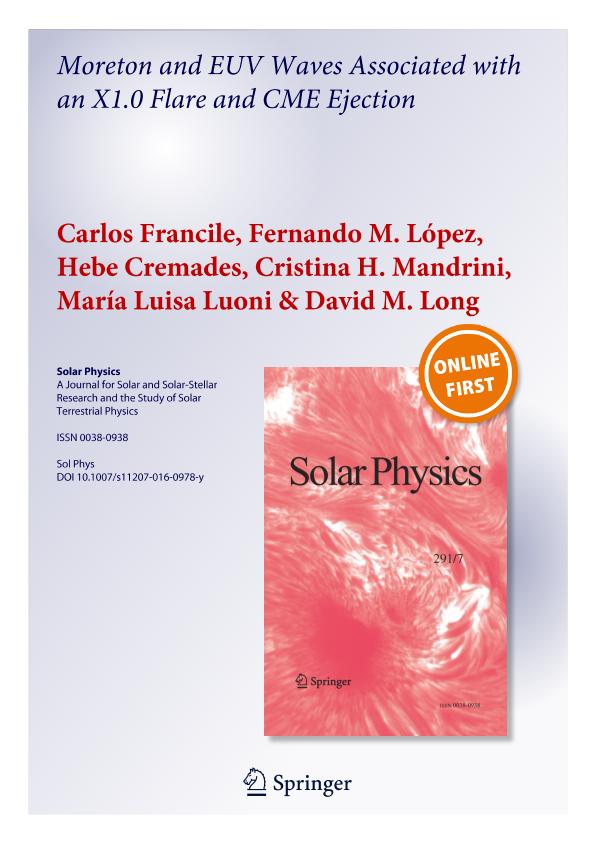Mostrar el registro sencillo del ítem
dc.contributor.author
Francile, Carlos Natale

dc.contributor.author
López, Fernando Marcelo

dc.contributor.author
Cremades Fernandez, Maria Hebe

dc.contributor.author
Mandrini, Cristina Hemilse

dc.contributor.author
Luoni, Maria Luisa

dc.contributor.author
Long, David M.
dc.date.available
2017-07-28T19:46:15Z
dc.date.issued
2016-09
dc.identifier.citation
Francile, Carlos Natale; López, Fernando Marcelo; Cremades Fernandez, Maria Hebe; Mandrini, Cristina Hemilse; Luoni, Maria Luisa; et al.; Moreton and EUV Waves Associated with an X1.0 Flare and CME Ejection; Springer; Solar Physics; 291; 11; 9-2016; 3217-3249
dc.identifier.issn
0038-0938
dc.identifier.uri
http://hdl.handle.net/11336/21554
dc.description.abstract
A Moreton wave was detected in active region (AR) 12017 on 29 March 2014 with very high cadence with the H-Alpha Solar Telescope for Argentina (HASTA) in association with an X1.0 flare (SOL2014-03-29T17:48). Several other phenomena took place in connection with this event, such as low-coronal waves and a coronal mass ejection (CME). We analyze the association between the Moreton wave and the EUV signatures observed with the Atmospheric Imaging Assembly onboard the Solar Dynamics Observatory. These include their low-coronal surface-imprint, and the signatures of the full wave and shock dome propagating outward in the corona. We also study their relation to the white-light CME. We perform a kinematic analysis by tracking the wavefronts in several directions. This analysis reveals a high-directional dependence of accelerations and speeds determined from data at various wavelengths. We speculate that a region of open magnetic field lines northward of our defined radiant point sets favorable conditions for the propagation of a coronal magnetohydrodynamic shock in this direction. The hypothesis that the Moreton wavefront is produced by a coronal shock-wave that pushes the chromosphere downward is supported by the high compression ratio in that region. Furthermore, we propose a 3D geometrical model to explain the observed wavefronts as the chromospheric and low-coronal traces of an expanding and outward-traveling bubble intersecting the Sun. The results of the model are in agreement with the coronal shock-wave being generated by a 3D piston that expands at the speed of the associated rising filament. The piston is attributed to the fast ejection of the filament–CME ensemble, which is also consistent with the good match between the speed profiles of the low-coronal and white-light shock waves.
dc.format
application/pdf
dc.language.iso
eng
dc.publisher
Springer

dc.rights
info:eu-repo/semantics/openAccess
dc.rights.uri
https://creativecommons.org/licenses/by-nc-sa/2.5/ar/
dc.subject.classification
Astronomía

dc.subject.classification
Ciencias Físicas

dc.subject.classification
CIENCIAS NATURALES Y EXACTAS

dc.title
Moreton and EUV Waves Associated with an X1.0 Flare and CME Ejection
dc.type
info:eu-repo/semantics/article
dc.type
info:ar-repo/semantics/artículo
dc.type
info:eu-repo/semantics/publishedVersion
dc.date.updated
2017-07-27T12:49:57Z
dc.journal.volume
291
dc.journal.number
11
dc.journal.pagination
3217-3249
dc.journal.pais
Alemania

dc.journal.ciudad
Berlin
dc.description.fil
Fil: Francile, Carlos Natale. Universidad Nacional de San Juan. Facultad de Ciencias Exactas Físicas y Naturales. Departamento de Informática. Observat.astron. Felix Aguilar; Argentina
dc.description.fil
Fil: López, Fernando Marcelo. Consejo Nacional de Investigaciones Científicas y Técnicas. Centro Científico Tecnológico Conicet - San Juan. Instituto de Ciencias Astronómicas, de la Tierra y del Espacio. Universidad Nacional de San Juan. Instituto de Ciencias Astronómicas, de la Tierra y del Espacio; Argentina
dc.description.fil
Fil: Cremades Fernandez, Maria Hebe. Universidad Tecnologica Nacional; Argentina. Consejo Nacional de Investigaciones Científicas y Técnicas; Argentina
dc.description.fil
Fil: Mandrini, Cristina Hemilse. Consejo Nacional de Investigaciónes Científicas y Técnicas. Oficina de Coordinación Administrativa Ciudad Universitaria. Instituto de Astronomía y Física del Espacio. - Universidad de Buenos Aires. Facultad de Ciencias Exactas y Naturales. Instituto de Astronomía y Física del Espacio; Argentina
dc.description.fil
Fil: Luoni, Maria Luisa. Consejo Nacional de Investigaciónes Científicas y Técnicas. Oficina de Coordinación Administrativa Ciudad Universitaria. Instituto de Astronomía y Física del Espacio. - Universidad de Buenos Aires. Facultad de Ciencias Exactas y Naturales. Instituto de Astronomía y Física del Espacio; Argentina
dc.description.fil
Fil: Long, David M.. Mullard Space Science Laboratory; Reino Unido
dc.journal.title
Solar Physics

dc.relation.alternativeid
info:eu-repo/semantics/altIdentifier/url/http://link.springer.com/article/10.1007/s11207-016-0978-y
dc.relation.alternativeid
info:eu-repo/semantics/altIdentifier/doi/http://dx.doi.org/10.1007/s11207-016-0978-y
Archivos asociados
